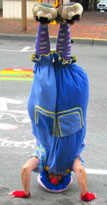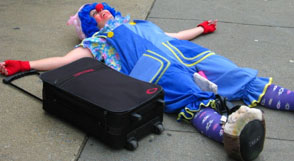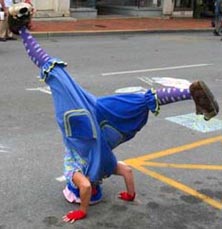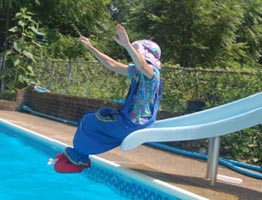Thursday Review Contributing Writer
While working with children, adults, “seasoned citizens,” able-bodied and hospice clients as a massage therapist, clown, teacher and musician, I have discovered that they all continue teaching me. Our aches, pains, stress levels and other ills can be directly related to being caught in the hamster wheel rather than living our lives. If you ever feel you are just another ant in the farm, or bee in the hive, maybe it is time for alternatives or practicing age old techniques like mind, body and spirit balance or homeostasis. Modern technology is available at our fingertips. Because of this fast-paced world, we speed up to keep up with duties and have no time left for play.

There were times when we actually enjoyed relaxation and took advantage of it every chance we got. What happened to the good ole’ days? According to current research, stress causes or exacerbates illness and disease, so maybe we need to go back to some basics.
Some people stress themselves out at the gym, because they haven’t relaxed. Fitness is good for you, of course, but as for stress levels, you can decrease it just as much by sitting in a room quietly for a little while.
How many adults allow time for leisurely exercise that brings so many health benefits? Aerobic exercise and muscular flexibility can improve fitness and quality of life in many different ways, according to a report on pain management. Sleep, weight control, stress, high blood pressure levels and headaches can improve with a good exercise program.
A woman coming from the gym said she made a New Year’s resolution to join a health club to work-out regularly and get in better shape. She worked hard for the first week and hated every minute of it. She never went back. Picking fun activities and adding some play time may bring better results for the efforts. Find something you like. Enjoying the exercise produces better results.
Ballroom dancing, water aerobics, Tai Chi and Yoga classes are popular these days. Funny, imaging how long other countries have used these old techniques for stress reduction. It is all about mind, body, spirit.
Music as relaxation is a good. Young David played music for King Saul to ease his fits of depression. Why music soothes is still a mystery, but whether you like rap, country or string quartets, studies show that it can have emotional and physiological benefits. Modern medicine is beginning to use music as another healing tool and there is no need for FDA approval.
Ears are amazing. Soothing sounds are all around like birds, frogs and babbling brooks, but the telephone, beeper, alarm or other technological conveniences take priority. Try sitting on a porch in the country at sunset and just listen for ten minutes. Go to the beach and make a special effort to get up at dawn and listen to the morning.
Aromatherapy is gaining popularity. Massage therapists use oils like vanilla, peppermint and lavender to soothe stressed out clients. Essential oils can balance your emotions because of the effect on the limbic brain. Simply putting a few drops of magnolia oil in a bath can help you relax after a long and stressful day. Lavender is great for stress. It soothes the spirit, relieves anger, tension and hyperactivity.
Remember the whiff of Grandma’s house on holidays and the homemade pie, turkey and biscuits in the oven? Many people use candles or incense to freshen a home during a long stale winter. The olfactory sense is strong and has a good memory. Baby shampoo and lotions can bring about that cuddly soothing feeling as well as the perfume mom always wears. Some people like the smell of the great outdoors.
Sunday drives these days are only to get to the mall early. There were days, not so long ago, when people actually went for a Sunday drive after church just to go, except maybe to drop in on some friends or family. Many times, there was no mission and the children played “I spy a...” as they rode along. Their eyes were open and taking in every site possible.
Americans have forgotten how to power down. Latin and European countries still have siesta time in the middle of the afternoon.
 The businesses close and families go home to rejuvenate. On the whole, they have fewer diseases than Americans. It’s all about balance.
The businesses close and families go home to rejuvenate. On the whole, they have fewer diseases than Americans. It’s all about balance.American children often get “time outs” for being naughty, but what about “time outs” for being good? People can decide for themselves how to spend their “time out.” Try sitting in a quiet room and writing in your journal or going for a walk alone. No beeper or cellular phone allowed! See how long you can stand it before you allow unnecessary life disturbances to creep into your space.
The mystery writer Edwin Brock has a profound statement in his book Five Ways to Kill a Man, which is decades old, but still true. “Simpler, direct and much more neat (to kill a man) is to see he is living somewhere in the middle of the twentieth century, and leave him there,” he wrote. We just do everything too fast, too hard and too long and our bodies suffer from it.
Stress and pain show in our bodies and it affects how we relate to each other. In another dated book, Look Younger, Live Longer Gayelord Hauser said, “Tension is ugliness; relaxation is beauty.” It is more pleasant to talk with a person who exudes comfortable feelings than “twitchy individuals” who make you feel nervous, he said.
In Bill Moyers’ book, Healing and the Mind, he interviewed health care practitioners from all over the world. Cardiologists in America to acupuncturists in China are exploring new ways to help chronic pain sufferers get relief by using stress reduction techniques.

Moyers interviewed Dr. Jon Kabat-Zinn, director of the Stress Reduction Clinic at the University of Massachusetts. Kabat-Zinn said that if he called his classes “Courses in Meditation” fewer people would attend because that sounds too exotic.
Dr. Michael Lerner is a policy fellow of the Institute of Health Policy Studies at the University of California, San Francisco. Moyers asked him about some of the techniques he is using. “Stress reduction involves things like meditation, progressive deep relaxation, and stretching exercises, all techniques that are fairly well known in the culture as a whole right now,” Lerner said. “Meditation is not for everybody. Some people may be better off playing tennis, or shooting pool, or listening to Bach,” he said.
Moyers asked Dr. Dean Ornish, director of the Preventive Medicine Research Institute at the University of California, San Francisco about changing life habits. “It’s not really what we do that leads to chronic stress and to illnesses, it’s what motivates what we do,” Ornish said. People have the disbelief that something external is going to bring them health, peace, intimacy and love, he said.
The Wit & Wisdom of Benjamin Franklin, written by James C. Humes shows that Franklin showed a lot of interest in living by common sense and preventative medicine. “Happiness in this world depends on internals, not externals,” Franklin said. Franklin exercised regularly and worked to maintain good health. He believed in brisk walks, climbing stairs, drinking water, quiet time, eating little red meat, swimming, getting plenty of rest and lots of fresh air.
Some people have found relaxation techniques that work for them and suggest that everybody find their own special quiet times to regroup. One 88-year-old client interviewed after a massage said people don’t let go anymore. She relaxes by doing jigsaw puzzles, reading and getting a massage once a week.
Another massage client in her 40s said her husband comes home for lunch and they also relax together during dinner. “If the power went out around the world for a week it would allow people to calm down and adjust priorities,” she said.
Dr. David Felten, professor of Neurobiology and Anatomy at the University of Rochester, talked with Bill Moyers about stress. Research reveals that some stressors in life affect the autonomic nervous system, and may have an impact on the immune system, Felten said.
PBS aired a series called Humor Your Stress featuring Loretta LaRoche, M.D. (mirth doctor). Because of the fight or flight response, some people tighten their jaws and grip the steering wheel commuting to and from work, LaRoche said. She believes we lost wisdom, simplicity, common sense and community at some point.
LaRoche has a few suggestions for reducing stress.:

